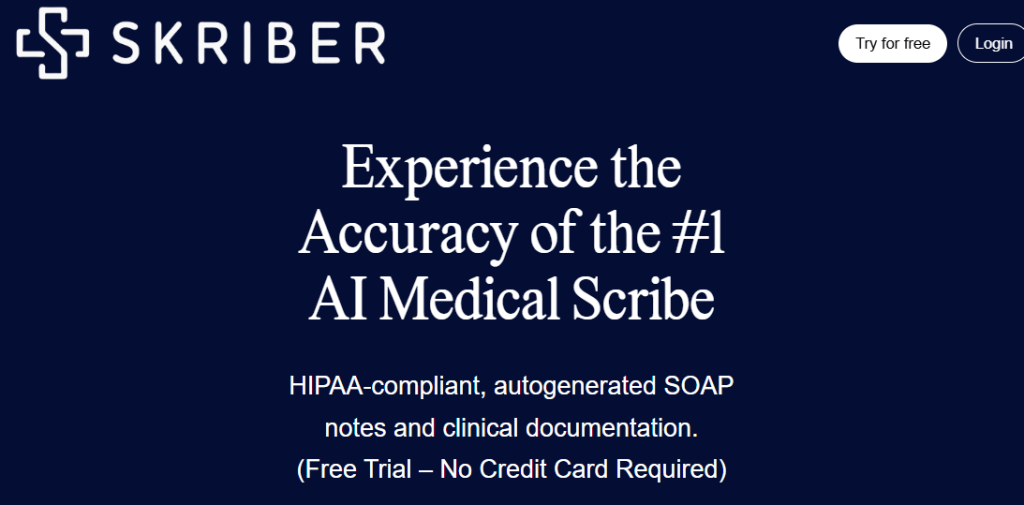
SKRIBER, the HIPAA-compliant AI scribing platform for healthcare providers, has raised $1.3 million in pre-seed funding to redefine how clinical documentation is created and managed. The round was led by SeedtoB Capital and Morgan Creek Capital Management, LLC, signaling strong investor belief in SKRIBER’s potential to become foundational infrastructure in the medical documentation space.
Founded by Hayden Plummer, SKRIBER is already being adopted by clinicians seeking a more accurate, efficient, and secure alternative to traditional scribing methods. By generating autogenerated SOAP notes in real time - without human scribes - the company is positioning itself at the forefront of AI-powered clinical productivity.
What SKRIBER Does
SKRIBER provides an AI-driven medical scribe that enables clinicians to automate note-taking and clinical documentation with high accuracy and full compliance.
Key capabilities include:
- HIPAA-compliant, AI-generated SOAP notes in real-time
- No credit card required for free trial access
- EHR-friendly outputs designed to integrate into existing clinical workflows
- High accuracy documentation that supports risk adjustment and coding
- Secure architecture built for US healthcare compliance and data integrity
- Optimized for time savings, letting providers focus on patients instead of paperwork
By eliminating the need for human scribes or manual transcription, SKRIBER streamlines one of the most time-consuming aspects of healthcare, allowing providers to reallocate energy to clinical care.
Why This Changes the Game
The clinical documentation burden has become a silent epidemic in healthcare. According to the Annals of Internal Medicine, physicians spend nearly two hours on EHR tasks for every one hour of direct patient care. This imbalance not only leads to burnout - it impairs patient outcomes.
SKRIBER isn’t just removing clicks; it’s redesigning the entire documentation paradigm by embedding intelligence into the note-taking layer.
The insight that sets SKRIBER apart lies deeper than its feature set. They’re playing a different game entirely: one rooted in contextual trust. Rather than building a generalized AI model and forcing it into the clinical setting, SKRIBER started with the hardest constraint first - HIPAA compliance and real-world documentation structure. Then, they built upward from that base. Most startups chase scale and plug in compliance later. But the inverse approach - designing your data architecture around constraint from day one - is what makes scale safe. This is a principle more founders should adopt, especially those tackling regulated or risk-heavy domains.
Because when your AI product sits in the middle of real-world workflows (like SKRIBER does with clinicians), you’re not just a tool - you’re infrastructure. And infrastructure companies don’t just win markets. They define them.
Founders often ask, “What’s our moat?” But the better question might be, “What’s our constraint, and how early did we embed it into the core product?” SKRIBER’s answer to that question is why they earned investor trust this early.
Market Outlook: AI in Clinical Documentation Is Heating Up
The medical scribing and documentation space is experiencing explosive growth as AI penetrates deeper into healthcare operations.
- The global healthcare AI market is projected to grow from $22.5 billion in 2023 to $187.95 billion by 2030, at a CAGR of 35.1%, with clinical documentation automation among the fastest-growing segments (Fortune Business Insights, 2024).
- The global medical transcription software market alone is expected to reach $5.4 billion by 2030, as hospitals and private practices move away from human scribes to more scalable AI-based documentation (Allied Market Research).
- A report by Medscape found that more than 70% of physicians cite administrative load, especially documentation, as the primary cause of burnout.
- The U.S. faces a shortage of over 124,000 physicians by 2034 (AAMC), pushing healthcare systems to adopt tools that boost clinical throughput without adding staff.
- With CMS updates coming into effect in 2025, more structured, codable, and accountable clinical notes will become mandatory for reimbursements and audits - putting automated documentation tools in the spotlight.
Legacy dictation tools and outsourced scribing services can’t scale cost-effectively or adapt quickly enough to this level of regulatory and clinical complexity. SKRIBER is leading a new generation of tools that are real-time, smart, compliance-native, and workflow-aware.
What’s Next for SKRIBER
With $1.3 million in fresh capital, SKRIBER is preparing to scale across both product and go-to-market fronts:
- Hiring across AI/ML, compliance, and health informatics to deepen product intelligence and ensure continued HIPAA-grade security
- Launching new integrations with leading EHR systems and practice management software
- Expanding its provider network, especially among small-to-mid-sized clinics underserved by legacy scribing solutions
- Rolling out multilingual note generation to better support diverse patient populations
- Developing predictive assistance tools that recommend documentation improvements based on specialty and visit type
The roadmap is focused on making SKRIBER a true AI co-pilot for clinicians, not just a documentation tool.
Why This Moment Matters
Healthcare is reaching an inflection point where productivity tech is no longer optional - it’s mission-critical. SKRIBER enters the scene not just as a cost-saver, but as an enabler of better care quality and clinical satisfaction.
For clinicians drowning in admin work, SKRIBER offers more than just efficiency - it offers peace of mind.
For investors and founders, this raise signals a bigger truth:
The next wave of breakout AI companies won’t just be data-rich. They’ll be workflow-native, vertical-specific, and deeply trusted.
SKRIBER is carving out that category in healthcare. And they’re doing it by building not just with AI - but with purpose.









